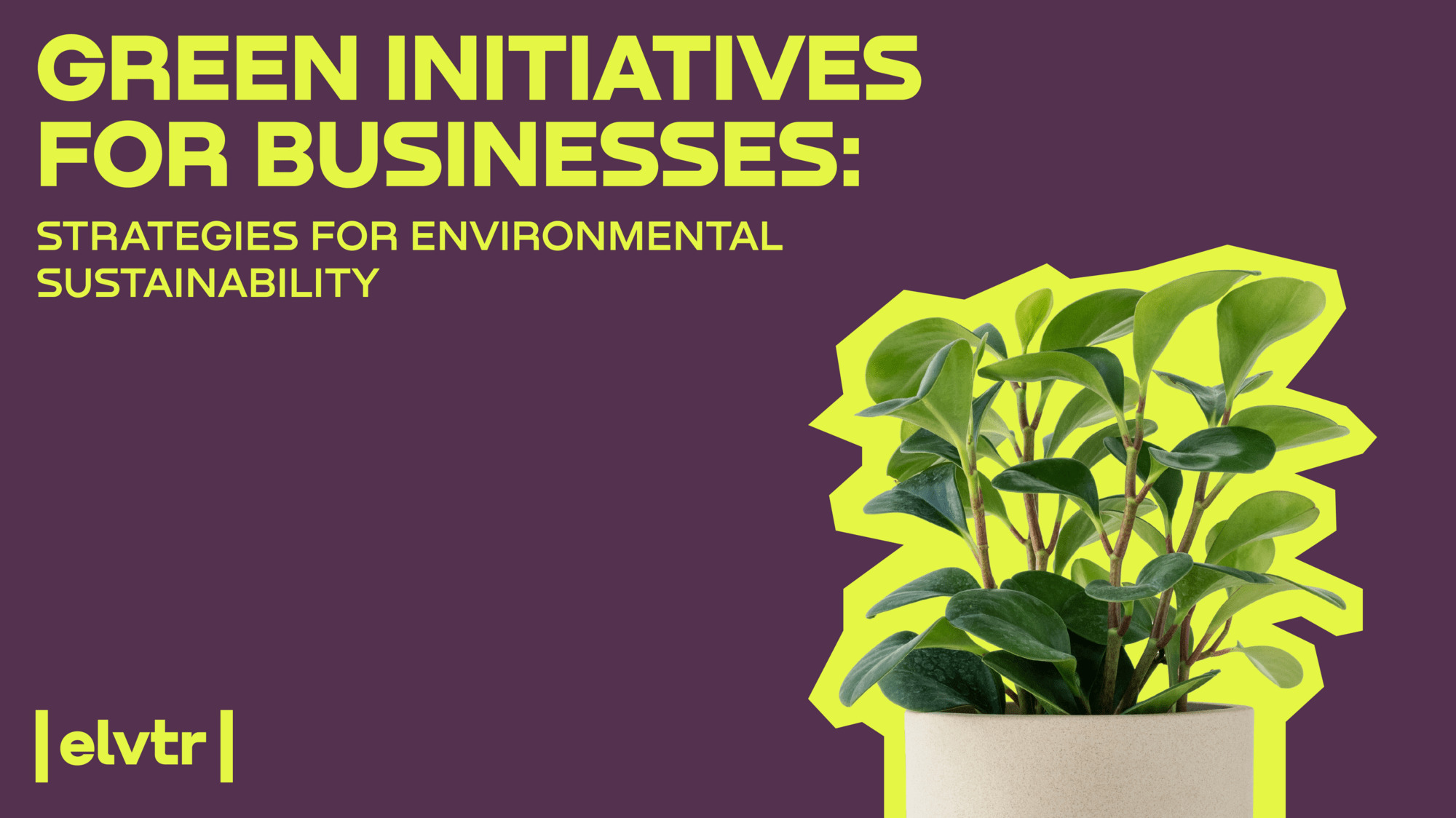- MAIN PAGE
- – elvtr magazine – GREEN INITIATIVES FOR BUSINESSES: STRATEGIES FOR ENVIRONMENTAL SUSTAINABILITY
GREEN INITIATIVES FOR BUSINESSES: STRATEGIES FOR ENVIRONMENTAL SUSTAINABILITY

Have you ever started your morning with a cup of coffee to go?
Most businesses offer paper straws that dissolve into drinks. Some will say that it is better not to use straws at all. It might be the most eco-friendly option, but it is not a business solution.
What can be the most Italian way to address this issue? Pasta straws. Not kidding. In fact, they are 100% biodegradable and even more sustainable than paper straws. While a pasta straw is not made for hot drinks, it definitely works with cold ones.
Eco-friendly business ideas are often on the surface. You just need to be observant and proactive. Sustainability is not just a trend: it’s a necessity for businesses that want to maintain a good reputation.
In this article, we will explore eco-consciousness and how businesses are adopting sustainable strategies to make a positive impact on our planet. Discover how companies can adopt eco-conscious strategies, make a difference, and inspire a greener future.
What Does “Green” Mean in Modern Business?
A "green" business cares about the environment and tries to be eco-friendly. It focuses on reducing waste, saving energy, and using sustainable materials. Green businesses may use renewable energy like solar power and try to make products that last longer and can be recycled.
Sustainability is a broader term. It means being responsible and mindful of a company's impact on the environment, society, and the economy. It involves making decisions that balance profit with environmental and social considerations. Sustainable businesses aim to achieve their goals while ensuring a bright future for the company, its stakeholders, and the planet.
Being sustainable is about more than just doing good. It's also about ensuring the long-term success of the business. Customers prefer to support environmentally and socially responsible companies.
All businesses leave a carbon footprint; it’s inevitable.
Unfortunately, not all industries can be eco-friendly due to the nature of their operations, but they can still reduce their harmful environmental impact. For example, heavy manufacturing industries can invest in cleaner technologies and emission reduction measures. Airlines and transportation companies can use fuel-efficient technologies and support carbon offset programs.
While they may not be perfect, these efforts can make a difference in protecting the environment.
Environmental Sustainability Strategy Explained
An environmental sustainability strategy is a well-thought-out plan businesses use to integrate eco-friendly practices into their operations. In a nutshell, it means making smart choices to save energy, reduce waste, and support sustainable initiatives.
By adopting an environmental sustainability strategy, businesses can show that they care about more than just profits. They can embrace energy-efficient technologies, go green with renewable energy, or participate in recycling and waste reduction efforts.
Businesses use various environmental sustainability strategies to reduce their impact on ecology and promote responsible practices. Some common strategies include:
- Energy smart moves. Businesses can be savvy with their energy use with energy-efficient lights and appliances.
- Renewable energy. Companies can opt for green power sources like solar panels and wind turbines to generate electricity that doesn't harm the environment.
- Reduce, reuse, recycle. Taking a cue from the three Rs, businesses can aim to minimize waste, reuse materials where possible, and promote recycling to lessen their impact on the planet.
- Mindful choices. When purchasing products and materials, businesses can support eco-conscious suppliers while choosing sustainable and eco-friendly materials.
- Water conservation. Being water-wise is essential. Businesses can lead the way by reducing water usage, recycling water where feasible, and supporting water conservation initiatives.
- Sustainable packaging. Opting for eco-friendly and biodegradable packaging helps reduce waste and ensures a more planet-friendly approach to product delivery.
- Green building design. During construction or renovation, businesses can incorporate eco-friendly designs and materials to create energy-efficient, environmentally responsible spaces.
- Climate action. Companies can contribute to the fight against climate change by reducing carbon emissions and adopting eco-friendly practices.
- Green certifications. Some businesses can earn special certifications that showcase their commitment to sustainability and environmental responsibility.
Top 5 Green Business Initiatives
From unique green business ideas to responsible travel initiatives and cutting-edge technologies, we've explored the potential for positive change. Here are some creative ways to organize a sustainable business:
1. Sustainable Glamping Retreat
Glamping, short for "glamorous camping," is a fun and comfortable way of experiencing nature. It's almost like regular camping but with added luxury and amenities. Instead of sleeping in traditional tents on the ground, glamping offers unique and cozy accommodations such as safari tents, yurts, treehouses, or eco-friendly cabins.
How to make it eco-friendly?
A glamping retreat can be powered using renewable energy sources such as solar panels. It might have composting toilets, recycle waste, and use eco-friendly cleaning products.
2. 3D Printing for Nature
Urban biodiversity conservation initiatives help us prevent turning our cities into concrete jungles.
3D printing can create plant-friendly environments that encourage greens to grow and flourish. Urban areas can be transformed into green spaces, enhancing air quality, reducing the urban heat island effect, and providing habitat for wildlife in the city.
Flexibility is probably the main advantage of this business. 3D printing allows the creation of unique and tailored planters and pots that can fit into tight urban spaces, such as balconies, rooftops, or vertical gardens.
Want some inspiration? Dutch Urban Reef is an example of using 3D ceramic prints that add more greens to urban landscapes.
3. Sustainable Fashion Initiatives
85% of manufactured textiles go to the dump. 100 billion garments are produced yearly - which is more than what the entire world population can wear in their lifetime. And most of the clothes are low-quality fast fashion items.
According to multiple studies, the fashion industry produces 2-10% of carbon dioxide emissions, which makes it the third-polluting industry in the world.
You don’t even need to have your own brand to make a difference.
Organize pop-up events or mobile fashion trucks that showcase sustainable fashion brands and designers. Collaborate with local eco-friendly vendors, offering a diverse range of ethical and environmentally responsible fashion choices.
Host fun and interactive DIY workshops where people can learn to upcycle old clothes into trendy and unique fashion pieces. You can also establish an online community that enables people to donate and exchange fashion items.
5. Sustainable Tourism Platform
Create a user-friendly online platform that curates eco-friendly travel destinations, accommodations, and activities. From breathtaking nature retreats to eco-resorts, travelers can find amazing options that prioritize sustainability and support local communities. Don't forget to highlight eco-tours and experiences that promote conservation and responsible tourism practices.
Develop a feature where environmentally conscious locals can offer personalized tours and experiences to travelers. This way, visitors can discover hidden eco-gems and support the local economy.
Every small action counts in the grand scheme of building a greener and more sustainable world. From embracing eco-friendly practices to integrating strategic approaches, we've witnessed the potential for positive change. Let's carry this inspiration into our daily lives, supporting eco-conscious businesses, responsible tourism, and sustainable practices in our communities.
.jpeg)






